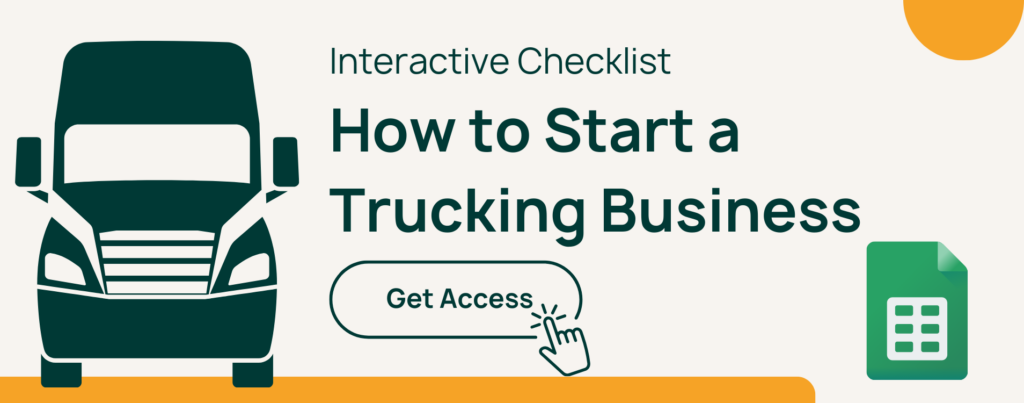What’s The Best Legal Structure For A New Trucking Business?
Deciding what legal structure to choose for your new trucking company is one of the first big decisions you’ll make for your business. We recommend you start with this step because you’ll need to know what legal structure you have before starting other processes like registering for an EIN.
As always, if you came across this article as an experienced trucking business owner, please leave a comment below with advice you have for up-and-coming trucking entrepreneurs.
Please note that this article is not a substitute for legal advice and is based on our knowledge of the trucking industry. Please seek legal counsel if you are unsure which legal structure is right for you.
Leer este artículo en español.
Subscribe to our YouTube channel for more videos!
Types Of Legal Structures
A legal structure is a classification for your company that determines aspects of your tax and legal obligations. Choosing the right structure for your trucking business from the beginning is important: you can change it in the future, but that can be difficult and expensive.
Here are the different types of legal structures to choose from:
Sole proprietorship
This structure is typically the simplest and cheapest to get started. In fact, this is the default in many states if you are operating a truck on your own. Being a sole proprietor means you are responsible for all the company’s profits and debts. It also means that there is no legal separation between you as a person and you as a business. This last aspect is the reason why we don’t recommend starting your trucking business as a sole proprietorship.
The reality is that trucking involves a lot of liability – with heavy-duty vehicles driving hundreds of thousands of miles, there will be (hopefully minor) accidents. If there is no separation between you and your business, you will be held fully responsible for any and all damages and harm done. This is a very dangerous position to be in.
Another reason we don’t recommend sole proprietorships: it’s harder to access financial services. With no legal separation between you and your business, creditors are less likely to work with you.
Partnership
A company with a partnership structure is also relatively simple to set up. It’s similar to a sole proprietorship in this way, but in a partnership, two people are sharing in the profits and losses of the business.
There are different types of partnerships to choose from as well. In a general partnership, everything is shared 50/50 and in a limited partnership, one partner maintains full control of the business’s operations.
Setting up your business as a partnership can have tax benefits when compared to a sole proprietorship, but still maintains little separation between the partners’ personal and business liabilities.
Limited Liability Company (LLC)
An LLC is the most common legal structure for small trucking companies and owner-operators for good reason. You can think of this structure as a mix between the previous two and a corporation.
Like starting as a sole proprietor or partnership, you don’t need to involve too many people in your business to get started. However, unlike those models described above, an LLC offers a level of separation between the owner(s) (also referred to as “members”) and the legal and financial liability of the business. The same is true for corporations, though there are additional requirements for forming a corporation which we’ll explain below.
An LLC can be formed by just one person or multiple people. A single-member LLC (started by just one person) is treated the same as a sole proprietorship by the IRS. You may be considered a single-member LLC if your other member is your spouse.
Corporation
When you start a business as a corporation, it’s a completely separate entity from its owners. There are multiple types of corporations: C corporations, S corporations, and B corporations, among others. Depending on the type of corporation, there are different benefits and drawbacks, particularly regarding taxes.
Like LLCs, in corporations, the owners are not personally liable for the company. So, for example, if the company is sued, the owner’s personal assets are not at risk. A corporate structure is advantageous in ways an LLC is not: it’s easier to transfer ownership of shares in a corporation than in other legal structures. It’s also easier to raise capital from investors as a corporation.
The downside of setting up a corporation is that it is more expensive and time-consuming than a sole proprietorship or LLC. There are additional requirements like setting up a board of directors that makes maintaining a corporation more work over time than other legal structures.
Cooperative
A cooperative (also referred to as a co-op) is owned by many members, or user-owners, who may be the company’s customers, employees, or other interested parties. This collective of people votes for the company’s decisions and shares in the profits. Cooperatives often have a purpose behind them beyond profit: they’re driven by values and a share social or cultural goal.
Cooperatives can be complex to set up and maintain. They require a board of directors and officers to run the company, as well as a voting system. However, cooperatives can be eligible for government funding while other structures are not. A cooperative also provides a unique opportunity to pool resources.

How To Choose A Structure
It’s important to remember that the transportation industry involves a lot of liability. No matter how careful you are as an owner-operator or fleet manager, accidents happen. When they do, it’s important to be protected, which is why we recommend a legal structure like an LLC or corporation that offers some separation between business and personal liability.
If you’re not sure where to get started in making this important decision, we recommend doing the following:
- Take some time to do additional research
- Review your business plan to see what structure fits your goals and vision for the future
- Talk to a legal professional about what’s best for your situation.

Article By
Keep Learning












